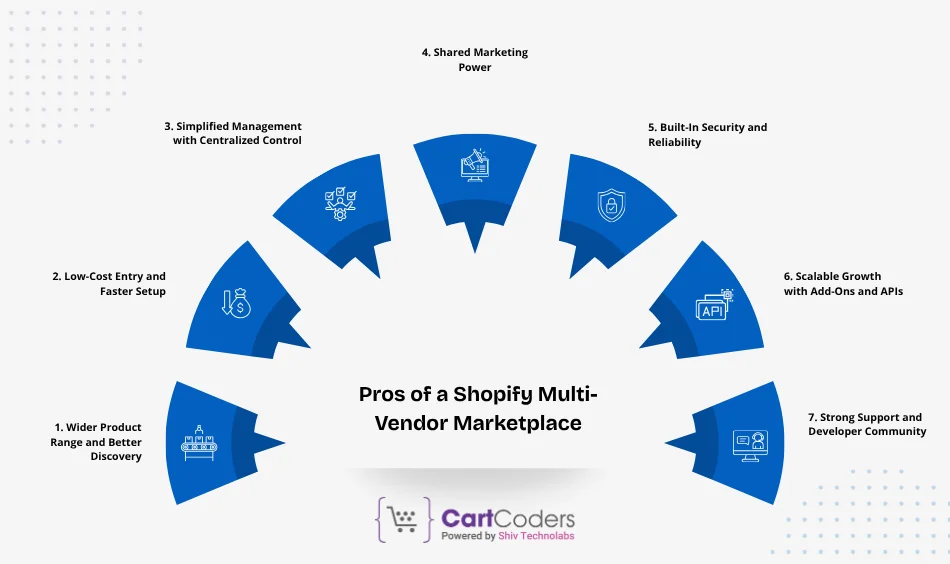Custom Engagement Solutions
Unlock tailored solutions with a free, no-obligation strategy session.
Expert Developers & Engineers on Demand
Scale Your Team with Skilled IT Professionals
Expert Guidance for Digital Transformation

Online shopping is no longer just about buying from one brand. Customers prefer platforms that bring multiple sellers together under a single storefront. That’s where the multi-vendor marketplace model shines. It offers variety, price competition, and convenience — all in one place.
Shopify, known for its flexibility and ease of use, has become a popular option for businesses aiming to launch such marketplaces. Even though Shopify was originally built for single-vendor stores, it can still support a multi-vendor setup through specialized apps and custom integrations.
Before investing in this approach, it’s essential to understand what works well and what challenges you might face. Let’s go through the key pros and cons of using Shopify for a multi-vendor marketplace.
A multi-vendor marketplace is an eCommerce platform that allows multiple independent sellers to list and sell their products through a single storefront. Each vendor manages their own catalog, pricing, and inventory, while the marketplace owner oversees the platform’s operations, including payment processing, commissions, and customer support.
Think of global platforms like Amazon, Etsy, or AliExpress — these are classic examples of multi-vendor systems where customers can buy products from different sellers in one checkout. The marketplace owner earns a commission on each sale or charges subscription fees to vendors for using the platform.
The main benefit of this model is variety and convenience. Customers get access to multiple brands and products in one place, while sellers gain exposure to a larger customer base without investing in their own independent website.
From a technical standpoint, running such a marketplace involves managing:
On Shopify, these capabilities aren’t available by default. However, through the use of Shopify apps, custom-coded features, or third-party software integrations, you can replicate this multi-vendor structure and operate your own marketplace efficiently.

Shopify has become a preferred choice for entrepreneurs building marketplaces because it reduces the complexity of running multiple stores under one system. While it isn’t a native marketplace solution, its app ecosystem, scalability, and security make it an excellent foundation.
Here’s a closer look at the main advantages:
A multi-vendor setup allows customers to browse thousands of products from various sellers in one store. This range increases the chances of customers finding what they want without leaving your platform.
It also improves product discovery — as more sellers list new categories, the marketplace attracts different buyer segments, driving organic growth.
Example: A fashion marketplace on Shopify might have local designers, accessory brands, and footwear sellers — all contributing to a richer catalog and more repeat purchases.
Building a marketplace from scratch can cost anywhere between $50,000–$100,000. With Shopify, you can start with a few hundred dollars per month using marketplace apps like Webkul Multi Vendor Marketplace or SpurIT Multi Vendor.
This approach is perfect for small businesses testing the marketplace model before scaling.
Shopify’s dashboard makes it easy to manage all operations from a single admin panel — product approvals, order tracking, and payout monitoring. With connected apps, you can automate vendor commissions, integrate payment gateways, and keep inventories synced.
Admins can also:
This level of control helps maintain quality and transparency across the marketplace.
When multiple sellers join your marketplace, they naturally bring their customer base with them. Each vendor’s promotions and social media visibility feed into the same store, creating a compounding marketing effect.
The result is a steady increase in traffic and brand reach without heavy advertising costs.
Shopify manages hosting, SSL certification, and PCI compliance, so marketplace owners don’t have to worry about security risks. The platform handles:
This reliability makes Shopify marketplaces stable even during events like flash sales or seasonal spikes.
As your marketplace grows, Shopify allows easy integration with ERPs, CRMs, and analytics tools. You can expand functionality using custom apps, automate reporting, and connect multiple payment systems without downtime.
Scalability also applies to traffic and vendor count — whether you start with 5 sellers or 500, the system adapts through app extensions and API workflows.
Shopify’s global ecosystem of developers, agencies, and partners means you’ll always find technical support or custom solutions. From theme customization to vendor portal creation, you can find experts experienced in marketplace builds.
This reduces long-term maintenance risks and gives you flexibility to evolve your store’s structure over time.
In short, Shopify’s simplicity, cost efficiency, and scalability make it a strong contender for anyone planning to launch a multi-vendor marketplace without massive development overhead.
While Shopify offers an easy and affordable path to launch a multi-vendor platform, it isn’t perfect. The same simplicity that makes it accessible also limits its flexibility for complex marketplace operations. Here are the main challenges you’ll likely face:
Shopify doesn’t include vendor-specific dashboards or access levels by default. This means sellers can’t log in to update their products, view order history, or manage refunds directly within the Shopify admin.
Most marketplace owners rely on third-party apps like Webkul or Jetti to provide these features. But even then, you might face:
In short, while apps fill the gap, they add layers of dependency that require regular monitoring.
Every sale on Shopify is subject to a transaction fee (unless you use Shopify Payments). On top of that, marketplace apps come with monthly subscriptions and add-on costs for premium features.
For example:
When multiple vendors are active, these costs can quickly rise and affect your profit margins — especially if your store operates on low-commission rates.
Each vendor might use a different shipping method or operate from a different region. Shopify doesn’t natively combine multi-vendor orders into one checkout shipment, meaning:
While third-party apps can help automate this, it still takes technical setup and careful management to avoid confusion for buyers.
When several vendors list similar products, competition on price can become intense. This not only reduces profit margins but also makes it harder to maintain consistent product presentation and brand identity.
Without strict vendor guidelines or moderation, your store can quickly appear disorganized — affecting buyer trust. Maintaining consistent image quality, tone, and pricing standards across hundreds of listings requires active curation.
A marketplace is only as strong as its sellers. Poor-quality listings, delayed shipping, or weak customer support from even one vendor can harm your entire platform’s reputation.
Although Shopify offers review apps and reporting tools, enforcing quality control still depends on the marketplace owner. You’ll need to set clear vendor policies and regularly review listings to maintain consistency.
If your marketplace needs features like multi-currency split payments, advanced commission rules, or region-based vendor payouts, Shopify’s structure can become restrictive. Many such customizations require external systems or heavy coding through APIs.
This can make scaling or integrating advanced business logic more difficult than on fully custom-built marketplace platforms.
In short, while Shopify provides a great starting point for small and mid-sized marketplaces, it requires thoughtful planning and the right mix of apps, integrations, and custom development to overcome these limitations.

Launching a multi-vendor store on Shopify is achievable — but it takes technical precision to make vendor management, commission handling, and automation work together smoothly.
At CartCoders, we help businesses build custom Shopify marketplaces that scale, perform, and deliver consistent results for every seller.
💬 Talk to our Shopify experts today to discuss your marketplace goals.
Shopify offers a solid foundation for launching a multi-vendor marketplace quickly and cost-effectively. It’s perfect for startups or small businesses that want to test a shared selling model without building everything from scratch.
However, for large-scale marketplaces with complex workflows, heavy customization, and unique commission structures, Shopify might need deeper integrations and expert development.
If you’re planning to create a feature-rich Shopify marketplace that runs smoothly for both sellers and customers, partnering with a professional team can make all the difference.
At CartCoders, we help businesses design, integrate, and scale Shopify multi-vendor marketplaces with custom apps, dashboards, and vendor-friendly features — built to perform and grow with your business. Contact us now!
Projects delivered in 15+ industries.
95% retention rate, building lasting partnerships.
Serving clients across 25+ countries.
60+ pros | 10+ years of experience.